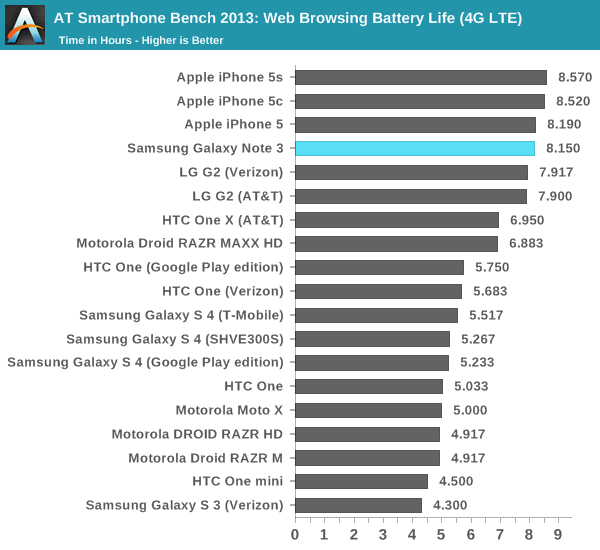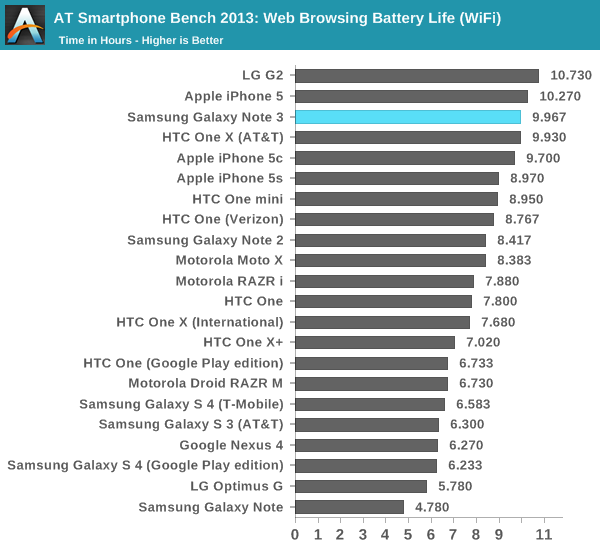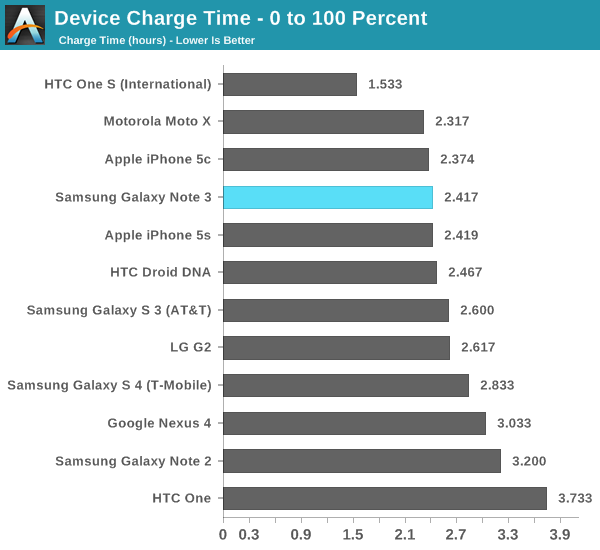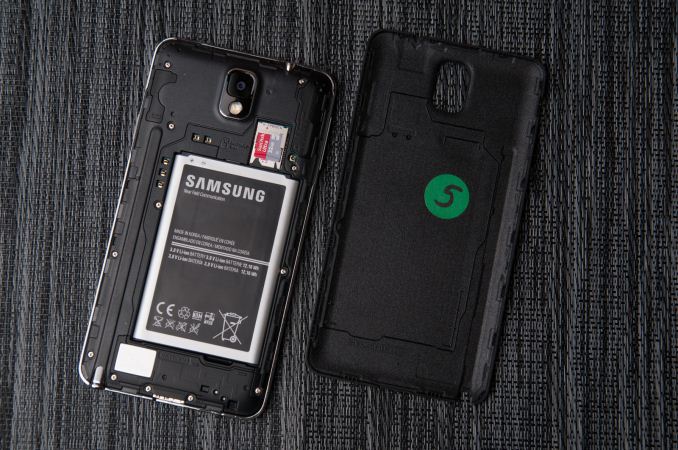Samsung Galaxy Note 3 Review
by Brian Klug on October 1, 2013 9:00 AM EST- Posted in
- Smartphones
- Samsung
- Mobile
- Android 4.3
- galaxy note 3
Battery Life
Battery life remains probably the single largest differentiator for devices lately, and of huge concern to enthusiasts and normal shoppers alike. We’ve already caught a glimpse of how well 8974 fares from a power perspective inside the LG G2, a device that posted some seriously impressive battery numbers. The Note 3 we’re looking at is also 8974 based since it’s a T-Mobile model, and thus we expect the same kind of battery life.
With this generation of Note, battery gets even larger. The Note started with a then quite large 9.25 watt hour battery, then Note 2 moved to 11.78 watt hours, and Note 3 now moves to a very large 12.16 watt hour battery with of course the newest 3.8V chemistry and all that comes along with it. Display size goes up, but those power gains are offset in other places.
After we talked about the panel self refresh features in the G2 a few people reached out and let me know that this feature has been shipping for a while in some phones, and it’s easy to check for. If we look under the display subsystem we can see that the same MIPI_CMD_PANEL type 9 is used, which refers to this type of interface.
Qualcomm HWC state: MDPVersion=500 DisplayPanel=9
define MIPI_CMD_PANEL ‘9’
Our battery life tests are unchanged and consist of a set of popular webpages that are loaded on a schedule with the display set to exactly 200 nits and repeated until the battery runs out and the device dies on both WiFi and cellular data connections. In this case that means T-Mobile LTE which is 10 MHz FDD in my market, I haven’t had a chance to run the Note 3 on HSPA+ yet, or complete the call test (which is starting to get ridiculous, and probably breaks 24 hours in the case of the Note 3).

On LTE the Note 3 does very well, coming just shy of the pack of iPhones, at just over 8 hours. Interestingly enough it’s just north of the G2s as well, which do have a smaller battery but also smaller display. The Note 3 also is the first device to ship with Qualcomm’s QFE1100 envelope tracker solution from the RF360 front end portfolio, which lowers power consumption by up to 20 percent and heat dissipation by up to 30 percent by allowing the power amplifiers to follow the desired output waveform. There’s more on that later in the cellular section.

On WiFi the Note 3 does better by 22 percent, but not the kind of huge jump I’m used to seeing between cellular and WiFi testing. This tells me the Note 3 battery life is really gated by the display, which is almost always the largest consumer of power in a device. That said the Note 3 does very well all things considered, especially in comparison to the APQ8064 (Fusion 3) phones which came before it, like SGS4. New silicon and new process inside MSM8974 definitely helps move battery life forward here with the race to sleep game.
Charging is an interesting story on the Note 3, but primarily because of what doesn’t change. The Note 3 continues to use Samsung’s tablet charging specification and charger, which has 2 amps of maximum output. The Note 3 draws 2 amps over a considerable amount of the charging curve, like other Samsung devices (in the linear part of the charge curve). USB 3.0 doesn’t change things up here quite yet with the new supported charge voltages that are coming eventually with the power delivery specification.

The Note 3 does charge faster overall compared to the SGS4 however thanks in part to the new PMIC (PM8941) which is part of the overall 8974 platform story.











302 Comments
View All Comments
Puddlejumper - Tuesday, October 1, 2013 - link
The disappointment here on this site isn't that Samsung is cheating, the problem is that AnandTech, which some of us considered the site with the most in depth and objective analysis, is aiding and abetting Samsung.Read the review. "More or less the fastest Android smartphone we have tested". "Isn't quite as fast as the iPhone 5s but in same cases it comes close". "Note 3 manages to get the edge over the powerVR G6430 in the iPhone 5s." And worst of all many screen of benchmark date that AnandTech knew was corrupted by Samsung but couldn't be bothered to even put an asterisk bedside the phones that they knew cheated on benchmarks. Instead, the explanation in the comments is that lots of phones are doing it so we will ignore it. Pity LG, Apple, and the rest of the manufactures who tried to play straight. AnandTech is telling them to bad, you should have cheated too.
It's clear why Samsung did it. I'm just extremely disappointed with AnandTech and their defense of their actions.
golemite - Tuesday, October 1, 2013 - link
It's a sad day when Anandtech condones cheating, and let's be honest- publishing poisoned benchmark results is exactly what that is.It used to be that I trusted Anandtech to deliver straight forward and honest reviews, but apparently everyone has their price.
fusoyaii - Tuesday, October 1, 2013 - link
Thanks to whoever mentioned the Ars review. I've never really gone to their site before, but after reading their REAL review of the Note 3, I think I'm switching to them as my main review site. I've been surfing AnandTech for years upon years and always looked forward to reviews here. I read entire articles for tech I'm interested in and knew about the "optimizations" that Samsung does, but it still makes a difference when you post charts/graphs showing unrealistic "tweaked" benchmarks.You guys should look at the Ars review of the Note 3 and learn from what they're doing. Including that video showing the real world lag of the software. Waiting for the Nexus 5 now...
Spunjji - Tuesday, October 8, 2013 - link
Why not read both and make your decisions that way..?tabascosauz - Wednesday, October 2, 2013 - link
The G2 came close to the iPhone 5S's results; it's nice to see the Note 3 take the prize for Qualcomm.I guess the 5S should really get some higher clocks.
ciparis - Wednesday, October 2, 2013 - link
Brian & Anand,I suppose it's obvious from the comments: people expect you to take a stand against cheating.
Unlike you guys, HardOCP was never known for their journalistic prowess. But I have to give them credit: when someone cooked the books, these guys would come unglued. Every aspect of the cheat would be laid bare for all to see, with the community in witness. The results speak for themselves: cheating on benchmarks by altering performance characteristics is not acceptable.
The industry will only do this as long as you let it. Sometimes you have to draw a line, and take a risk. There's no guaranteed outcome. But as a reader, I have come to expect that from you. It's a compliment (I hope).
ciparis - Wednesday, October 2, 2013 - link
One more note, in case it isn't obvious: these published benchmarks on Anandtech are taken as a statement of record.As such, it seems to me that the only thing people should be seeing here are results with no performance adjustments, or where you have defeated the measures -- since the entire point is to establish the relative performance people can expect in actual use.
Blairware - Wednesday, October 2, 2013 - link
I didn't have time to read 18 pages of comments, so I hope that I'm not being redundant in mentioning a mistake in the review. There are only 2 microphones for noise cancelation. the third small hole is for temperature / humidity sensor, just like the 3rd hole on the GS4. I was surprised to see this type of error on Anandtech of all places.jgrnt1 - Wednesday, October 2, 2013 - link
Though I rarely comment, I've been coming to AnandTech for years for objective, in-depth reviews. I have to say I was concerned when AMD "bought into" the site a few weeks ago. It seemed sort of like the big donor who backs a political candidate. The candidate will always claim that no influence was bought by the donation, but it will always be in the back of your mind. Integrity and trust suffer. The minimizing of Samsung's benchmark cheating is a sign that we need to question the integrity of the reviews presented here.Anand, I realize you need to monetize the site. It is your business. You have to pay the bills. However, people have come to your site over the years only partially because of the depth of your reviews and analysis. They have also come because they believed in your integrity. They trusted you. As others have said, by posting the benchmark results in your review without strongly calling out Samsung for cheating, you have rewarded the behavior. People who read the review, but who do not read the comments, will have a much more favorable opinion of the device and of Samsung's business practices than those who go to Ars and read their article. You have let down the people who trust you to be objective.
This morning, I read the Ars article. I was then on Gizmodo and, after reading their review of the Note 3, pointed to the Ars article in my comment. Then I came here, looking forward to seeing the review doing what I knew it would do. I expected an article with a lot more depth than the Ars review, but with the same tone. Cheating is unacceptable and must be called out loudly when it occurs. Instead, there was a brief mention and then the benchmarks were presented with the inflated numbers.
I think you should redo the review with corrected benchmark results and call out Samsung for cheating. Trust in your integrity built this site. Distrust will ruin it.
Squuiid - Wednesday, October 2, 2013 - link
+1